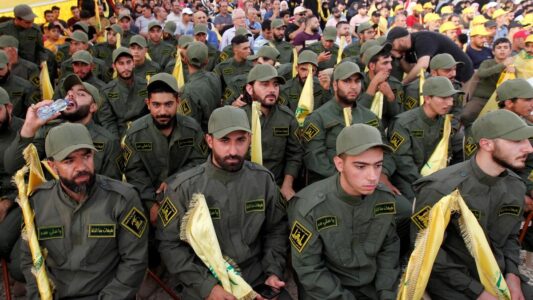
Will Hezbollah face continued pressure in 2021 in Europe?
Hezbollah has suffered devastating blows in the past year and could be further pressured in 2021, a study by Al-Ain media that goes against the conventional wisdom asserts.
Many have been predicting that a new US administration will relax sanctions on Iran, enabling Tehran to pour millions into Hezbollah’s coffers, after the Islamic Republic has been struggling to pay terrorist salaries over the past year, due in part to the Trump administration’s sanctions.
Hezbollah has sucked Lebanon dry in terms of resources, pouring money into missiles and bunkers while the country sinks into multi-billion dollar debt.
Iran’s goal in Lebanon – as in Iraq, Syria and Yemen – is to make the countries dependent on Tehran. Iran and its proxies never build institutions like universities; instead they make sure that the economy shifts to Tehran, with countries like Iraq now dependent on Iran for refining capability and electricity.
Like the Soviets stripping factories and sending their parts to the east, the Iranian proxies strip countries of their economy and also send it east. The ruination of Iraq and Lebanon, held hostage by Hezbollah, is evidence of this.
But, bucking this trend, Al-Ain thinks Hezbollah could be facing real pressure this year following new rulings in Europe. The year was disastrous for the terrorist group, “as it suffered devastating blows in several European countries that oscillated between bans and strong sanctions,” the article notes. “These steps pave the way for stronger measures in 2021, which put the future of the Lebanese militia in the old continent on the line.”
Berlin banned Hezbollah in April, striking a “severe blow to the terrorist militia that relies on Germany to collect donations to finance its criminal activities,” the article notes. “Four months after this date, and specifically last August, Lithuania banned Hezbollah members from entering its territory for 10 years, in a move to contain the threat of the Lebanese militia.”
The article also notes that Estonia has moved against the group, “imposing a ban on entering the country on members of Hezbollah, who belong to its military and political wings, and imposes sanctions on certain leaders of the organization, which are expected to be named during the coming period.”
Slovenia has also acted against Hezbollah, accusing it of “links to organized crime and terrorism, and military activities at the global level.” Latvia also designated it a terror group in December.
Five European countries have thus far taken measures against the group, many of them in 2020.
“The number of European countries that completely ban the Lebanese militia in Europe has increased to six countries,” Al-Ain notes. The media organization also predicts that Switzerland and Austria could “take strong measures against Hezbollah.”
Switzerland is seeking to investigate whether Hezbollah is also active there, “and to prepare a comprehensive report on the status of the organization and its branches and activities in the country.” Concerns in Switzerland also relate to the group using bank accounts in the country.
The newspaper Luzerner Zeitung claimed that “Hezbollah maintains a network in Europe and also in Switzerland capable of supporting terrorist acts and activities.”
Austrian media outlets believe the Austrian government will make a decision to ban Hezbollah in the coming months, especially in light of the authorities recent launching of a strong campaign against terrorist organizations, including the Muslim Brotherhood, Al-Ain says.
All of this is building momentum against the group. Hezbollah illegally holds 150,000 rockets in Lebanon and has a global network of money laundering, terrorist entities and involvement in drug trafficking from South America to Africa and Europe.
In the past, Tehran was able to influence Washington to go soft on Hezbollah in order to get the Iran deal, judging that the US would do everything to get a deal done.
Al-Ain’s report says that there is momentum across Europe building against Hezbollah. This could see the group added to a continent-wide terror list. However, it is not clear if powerhouses like Germany or France will agree. France has appeared to be willing to work with Hezbollah in Lebanon, pretending its “political” wing is different from its “armed” wing.
Germany’s Angela Merkel has been accused of being soft on extremist groups operating in the country, but she is expected to be leaving office after being in power for two decades. There are also questions about how a new US administration will behave toward the group.
Al-Ain media points out that European Parliament Vice President Nicola Beer and others have been good on this issue, “leading a campaign against Hezbollah at the European level.” These voices have argued that Germany’s ban on Hezbollah is a long-awaited step, which must now be followed quickly, with a complete ban on the party’s activities in the entire union.
Source: JP





